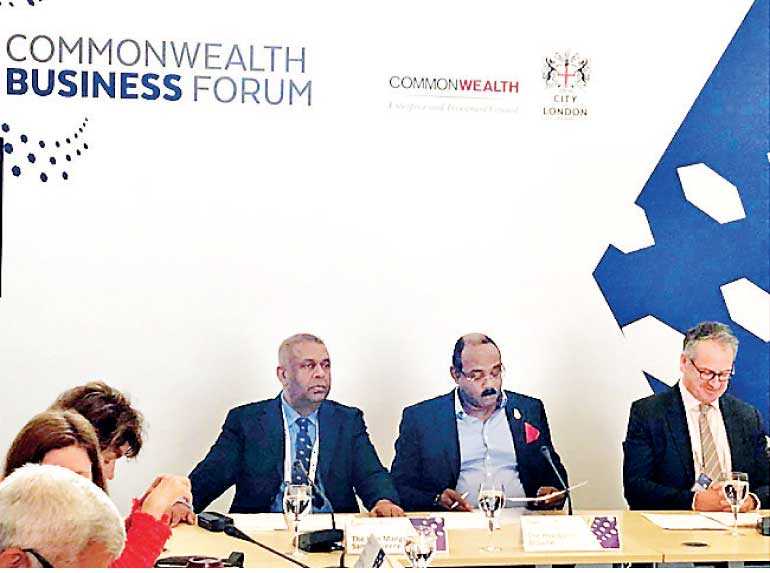Wednesday Feb 25, 2026
Wednesday Feb 25, 2026
Wednesday, 18 April 2018 02:17 - - {{hitsCtrl.values.hits}}

Finance and Media Minister Mangala Samaraweera said Sri Lanka had long identified the risk of financial crime as a priority area given the country’s history of battling a sophisticated terrorist organisation and the Government was currently working on bringing necessary amendments to existing regulation combatting financial crime.
Samaraweera made these remarks at a roundtable discussion titled ‘Financial Regulation: Working Together to Address De-Risking’ held on the sidelines of the 2018 Commonwealth Heads of Government Meeting (CHOGM), at Mansion House in London yesterday.
The Minister stated that the sophistication of financial crime had increased exponentially in recent years and it posed a threat to all nations which has resulted in a number of negative effects for international finance.
“One such negative fallout is ‘de-risking’, the scenario of global banks selectively withdrawing from the business of correspondent banking. This can have highly detrimental implications for banks in developing countries in particular as it can shut them out of the global financial architecture,” the Minister added.
Minister Samaraweera also stated that the challenge for countries like Sri Lanka was finding ways to ensure the continued progress of financial inclusion in this context.
“At a more micro level, one of the major objectives of our Government, embodied in the 2018 Budget, themed ‘Enterprise Sri Lanka’, is to empower entrepreneurs by providing access to finance. In order to ensure access to finance at the grassroots level, it is important for the Sri Lankan financial system to have robust access and engagement with the global financial architecture,” Samaraweera said.
The following is Samaraweera’s full statement.
It is a pleasure to participate at this roundtable on an important and timely topic.
As the dynamics of the finance industry and technology constantly evolve, it is essential that financial regulations remain one step ahead. The sophistication of financial crimes has increased exponentially in recent years and is a threat to all nations, be it developing or developed nations. This has resulted in a number of negative fallouts for international finance.
One such negative fallout is ‘de-risking’, the scenario of global banks selectively withdrawing from the business of correspondent banking. This can have highly detrimental implications for banks in developing countries in particular as it can shut them out of the global financial architecture.
This is largely attributed to the shortcomings of the existing structure of the financial system. Given the importance of correspondent banking in a globalised world, it is important to take measures to enhance respondent banks’ capacity to manage risks, improve communication between correspondent and respondent banks, strengthen and effectively implement regulatory and supervisory frameworks in line with international standards, particularly for Anti Money Laundering and counter-terrorist financing.
Sri Lanka has long identified the risk of financial crime as a priority area. Given the country’s history in battling a sophisticated terror organisation, addressing terrorist financing has long been on the agenda. A number of measures were taken over the years and the Government is currently working on bringing in necessary amendments to some of the existing regulations with the objective of preventing financial crimes. Those measures include the introduction of Prevention of Money Laundering Act in 2006, Convention on the Suppression of Terrorist Financing Act in 2005, introduction of the Financial Transaction Reporting Act in 2006 and setting up the Financial Intelligence Unit at the Central Bank.
More recently, steps have been taken to address emerging issues in the internationalisation of financial crimes and to meet our global obligations as well.
Since November 2017, Sri Lankan authorities have taken a number of measures to enhance Anti-Money Laundering compliance such as introducing amendments to the Trust Ordinance, Companies Act, enactment of the Proceeds of Crimes Act, enhancing Customer Due Diligence Rules and regulations on targeted financial sanctions on proliferations.
The challenge for countries like Sri Lanka is how to ensure continued progress of financial inclusion in this context. At a more micro level, one of the major objectives of our Government, embodied in the 2018 Budget themed Enterprise Sri Lanka, is to empower entrepreneurs by providing access to finance. In order to ensure access to finance at the grassroots level, it is important for the Sri Lankan financial system to have robust access and engagement with global financial architecture.
As the financial system develops, the laws and regulations aimed at preventing financial crimes need to be updated. Sri Lanka very well understands this reality and is taking every necessary measure to keep abreast of the regulatory developments.
Furthermore, the Government is working with the Financial Action Task Force (FATF) in strengthening laws to prevent financial crimes. Based on their recommendations, a number of measures, including amending laws and regulations, were taken by authorities.
Nonetheless, the challenge for financial regulation remains significant and staying ahead of the curve is onerous but it is indeed imperative.